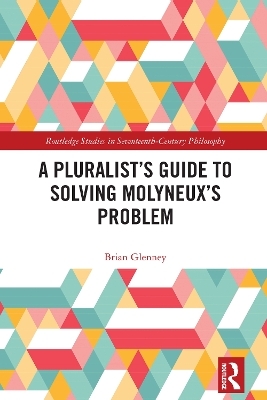
A Pluralist’s Guide to Solving Molyneux’s Problem
Routledge (Verlag)
978-1-032-18571-2 (ISBN)
- Lieferbar (Termin unbekannt)
- Versandkostenfrei innerhalb Deutschlands
- Auch auf Rechnung
- Verfügbarkeit in der Filiale vor Ort prüfen
- Artikel merken
This book presents a novel pluralist strategy for answering Molyneux’s 300+-year-old conundrum: Would a person, born blind but given sight, identify a shape previously known only by their touch? The author interweaves historical scholarship with contemporary philosophical work and empirical research on animal, infant, and adult human perception.
The author argues that we need a new approach to Molyneux’s problem because we do not know what the problem is really about, and it is untestable because a Molyneux subject cannot be physically realized. He criticizes Molyneux’s question for its simplistic taxonomy of "the blind" that groups significant individual differences into a singular ontology. Research in the cognitive sciences confirms that various kinds of blindness can co-occur, such as ocular, cortical, and psychological blindness. Therefore, the author adopts an explanatory pluralism for answering Molyneux’s problem, which includes no, yes, and "no answer" answers according to the domain of inquiry being used. This account provides a research-based answer to a long-standing problem using previously unheeded insights particularly from animal crossmodal perception studies to retell a more complex story of perception: its levels of explanation and integration.
A Pluralist’s Guide to Solving Molyneux’s Problem will be of interest to researchers and advanced students working in comparative psychology, epistemology, history of philosophy, philosophy of perception.
Brian Glenney is Associate Professor of Philosophy at Norwich University. He has wide interests in the history of philosophy and sensory perception. He focuses on Molyneux’s problem and co-edited the book Molyneux’s Question and the History of Philosophy (2020), the special issue “Molyneux’s Question Today,” (2024) and has authored encyclopedia entries and journal articles.
Plan of the Book 1. Seven Problems for the Two-Choice Approach to Molyneux’s Problem 2. Molyneux’s Tool and the Philosophy of Perception 3. Puzzle Pluralism: A Broad Explanatory Account for Molyneux’s Problem 4. A Pluralist Resolution to Molyneux’s Problem 5. Locke’s Answer and a Plug and Play History of Molyneux’s Problem 6. The New Molyneux Problem 7. Molyneux’s Animals: Promises and Problems 8. Meaningful Movements of Molyneux’s Animals 9. Molyneux’s Underwater Animals and the Possibility of a Supramodal Sense 10. A New Skill-Based Experimental Paradigm for Testing Molyneux’s Problem Epilogue
| Erscheinungsdatum | 07.12.2024 |
|---|---|
| Reihe/Serie | Routledge Studies in Seventeenth-Century Philosophy |
| Zusatzinfo | 4 Tables, black and white; 12 Line drawings, black and white; 7 Halftones, black and white; 19 Illustrations, black and white |
| Verlagsort | London |
| Sprache | englisch |
| Maße | 152 x 229 mm |
| Gewicht | 620 g |
| Themenwelt | Geisteswissenschaften ► Philosophie |
| Geisteswissenschaften ► Psychologie ► Allgemeine Psychologie | |
| Geisteswissenschaften ► Psychologie ► Verhaltenstherapie | |
| Sozialwissenschaften ► Soziologie | |
| ISBN-10 | 1-032-18571-6 / 1032185716 |
| ISBN-13 | 978-1-032-18571-2 / 9781032185712 |
| Zustand | Neuware |
| Informationen gemäß Produktsicherheitsverordnung (GPSR) | |
| Haben Sie eine Frage zum Produkt? |
aus dem Bereich


